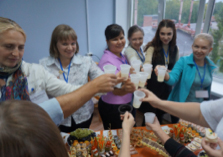Siberia and the Russian Far East (SRFE) comprise a large proportion of all northern lands, and they are experiencing rapid climate warming. Their important role in global climate processes (e.g., permafrost thaw, forest fires, and associated carbon release) is poorly understood, partly because of general difficulties of access and because regional research centres are few, widely scattered and often only weakly supported by Moscow. A mix of stronger in-country linkages and international collaborations can move the science forward. In 2018, I obtained funding from the UK Foreign Office to forge links between scientists in the UK and SRFE. Maarten van Hardenbroek (Newcastle) is my UK partner in this enterprise.

(Photo Arseny Galimov)
In 2018, Maarten and I ran two workshops in Russia: in Magadan in March and in Tomsk in December (past and present PLUS people Charlotte Clarke, Thierry Fonville, Kim Davies, and Helen MacKay, and Andy Henderson from Newcastle, made up the teaching teams). The first meeting featured scientists representing six scientific institutes across SRFE. We emphasized the role of early-career researchers (ECRs) in the workshops, and we are excited at the number of ECRs—and female scientists—participating. In addition to mapping potential avenues for joint work, we carried out training in new analytic approaches for Russian laboratories, discussed how to enhance international collaboration and how to develop joint research efforts across institutes. The workshop resulted in the formation of a UK-Siberia scientific working group: DIMA (Developing Innovative Multiproxy Analyses—in Siberia and the Russian Far East).
A follow-up meeting took place in September in Tomsk. The number of participating institutes has since grown to 12. This focus was on developing standardized field and sampling methods, and we collected material in the field for joint analysis. We are currently preparing a special volume of the Quaternary Boreas to show-case the research currently being carried out by our Russian partners, and we have received NERC funding to expand our activities to scientific exchanges and further field tips and workshops.
We are now looking for UK scientists interested in collaborating with Russian investigators on long-term environmental change in SRFE. You can get further information from me (m.e.edwards@soton.ac.uk) or Dr. Maarten van Hardenbroek (maarten.vanhardenbroek@newcastle.ac.uk).

